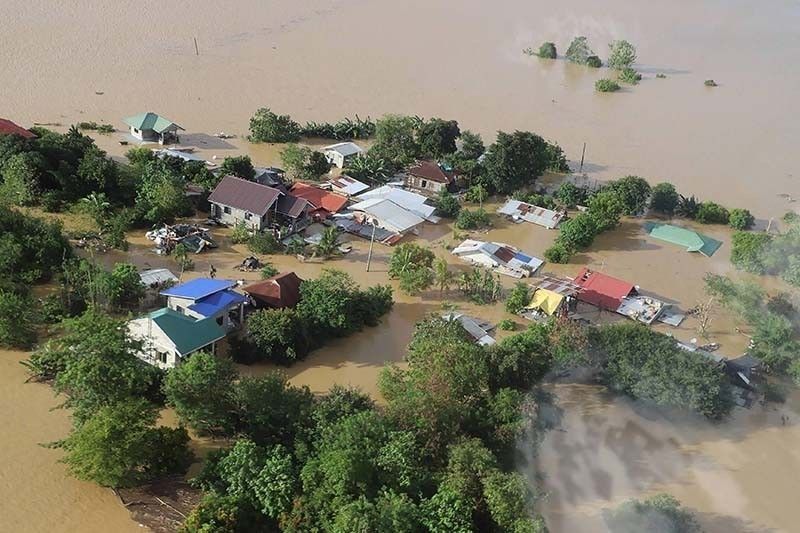Climate vulnerable Philippines must strengthen adaptation strategies — experts

MANILA, Philippines — The latest report released by the United Nations’ climate panel rings alarm on the urgent need for the country to strengthen measures that will help Filipinos cope in a warming world, experts said.
Nearly half of the planet’s population are highly vulnerable to increasingly dangerous climate impacts, according to a report of the Intergovernmental Panel on Climate Change, which said that climate shocks will become more severe with every increment of warming.
The report finds that climate change is harming people’s physical and mental health, increasing incidence of vector-borne diseases such as dengue, displacing people from their homes, and reducing food and water security.
In Southeast Asia, there will be “increased losses in coastal settlements and infrastructure due to flooding caused by unavoidable sea level rise,” the IPCC report said. By mid-century, over a billion people living in low-lying coastal settlements are projected to be at risk from coastal-specific climate hazards.
The report concluded that time had nearly run out to ensure a “liveable and sustainable future for all.”
“If we don’t succeed within this decade, we will face more dire impacts of climate change… We really need to do what we can to make sure our ecosystems, human societies can adapt to the warming that is already unpreventable,” Greenpeace Philippines country director Lea Guerrero said.
Bolster adaptation measures
The report puts emphasis on feasible and effective adaptation options such as early warning systems, nature-based solutions, conservation and restoration of different ecosystems and energy generation diversification.
Rodel Lasco, executive director of non-profit research organization Oscar M. Lopez Center, told Philstar.com that the report sends a clear message that Southeast Asian countries, including the Philippines, should strengthen strategies to adapt to climate change impacts. Lasco is one of the lead authors of the report.
The Philippines is one of the most vulnerable countries to climate hazards. Aside from sea level rise, it is also at risk from tropical cyclones, flooding, drought and biodiversity loss.
“The Philippines must heed the call of the report for concerted action, both internally and globally. We need a holistic and multi-sectoral approach to enhance the resilience of our people to new climate hazards such as stronger typhoons,” Lacso said.
To cope with sea level rise, the conservation and expansion of mangrove and beach forests in the country must be supported, the IPCC author said.
He added that watersheds should be protected and their forest cover should be restored to reduce the impacts of flooding. “Riverbanks and drainage systems should be kept healthy and clean. Proper waste management should be pursued. Human settlements must be discouraged in areas with severe flooding risks.”
The IPCC report also highlighted the dangers of maladaptive responses to climate change, which refer to actions that may result in increased vulnerability to climate change impacts or reinforce existing inequities faced by marginalized people. An example of maladaptation is building a sea wall to protect against storm surges, which may lead to increased exposure to climate risks unless integrated into a long-term adaptive plan.
This means that policymakers should go beyond short-term solutions, Greenpeace's Guerrero said.
“The report reinforces that adaptation is not actually about structures, sea walls. It’s really building the adaptive capacity of communities, working with communities, and understanding their needs and rights,” she said.
Adaptation gap
The IPCC warned that global warming is outpacing the preparations of countries: “At current rates of adaptation planning and implementation, the adaptation gap will continue to grow.”
“Most observed adaptation is fragmented, small in scale, incremental, sector-specific, designed to respond to current impacts or near-term risks and focused more on planning rather than implementation,” the report said.
Greenpeace Philippines campaigner Khevin Yu pointed out that while local governments have local climate change action plans, “the problem is actions plans are not implemented.”
Lack of finances also hampers greater adaptation to climate change in the Philippines.
“Our policymakers must ensure that climate change action is embedded in national and local plans and budgets,” Lasco said.
A pledge to provide $100 billion a year to developing countries to help bolster their defenses against climate change was not met in 2020, according to a report released last year, which said the goal is now expected to be attained in 2023.
In COP26 climate talks last year, nearly 200 countries clinched a major deal that called on nations to boost their commitments to slash emissions of planet-heating gases by end-2022 and urged wealthy economies to “at least double” their funding to help vulnerable communities.
“That’s why we’re calling for the Philippine government to really have a strong stand in international platforms to call for increasing climate finance, make sure that developed countries put the money needed on the table, and call for money for loss and damage,” Guerrero said.
'Defining issue of next admin'
Urgent and more ambitious adaptation measures must go hand in hand with rapid and deep cuts in greenhouse gas emission to enable a “climate resilient government,” the report stressed.
“Climate resilient development is enabled when governments, civil society and the private sector make inclusive development choices that prioritize risk reduction, equity and justice and when decision-making processes, finance and actions are integrated across governance levels, sectors and timeframes,” it said.
Greenpeace pointed out that it is important that tackling the impacts of climate change is among the priorities of those who will win in the May polls as the climate crisis is “the defining issue of the next administration.”
“We need to start asking our future leaders what they plan to do during the six years allotted to them at this crucial juncture when the climate crisis urgently needs to be addressed,” said Greenpeace campaigner Virginia Benosa-Llorin.
“Without urgency, and without a bold, coherent plan of action, Filipinos stand to lose more loved ones, homes, and livelihoods.”
- Latest































